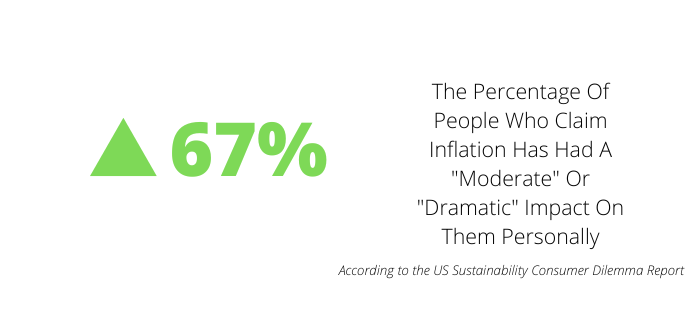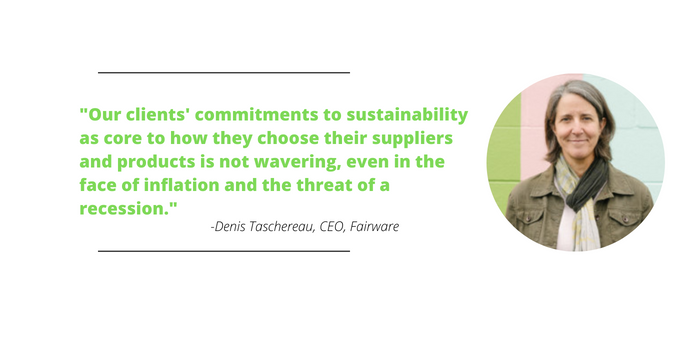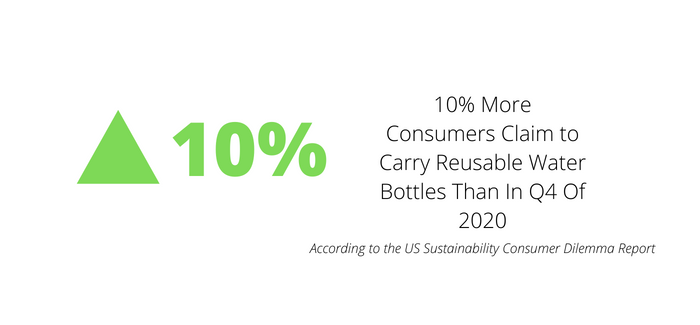How Inflation Is Affecting Sustainability Expectations

The annual inflation rate for the U.S. is 9.1% for the previous 12 months ending in June, which accounts for the largest annual increase since November 1981, and is certainly something on the mind of many in the promotional products industry. At the same time, sustainability efforts have been a top expectation of promotional products distributors and suppliers as buyers increasingly prioritize products that will not have a negative impact on the environment.
Parsing out whether inflation is affecting sustainability efforts is difficult, but looking at recent consumer habits can begin to paint a picture.
One study of the collision, the U.S. Sustainability Consumer Dilemma Report, was released recently, detailing how inflation is impacting consumers’ sustainable actions.
The Report
- The report, initiated by consumer data provider GWI, relies on a survey of over 20,000 U.S. internet users age 16 or older each quarter, in addition to supplementary data.
- The “Consumer Dilemma” aims to take a closer look at what the cost-of-living crisis means for sustainable behaviors and attitudes from consumers.
- It attempts to look at what’s on consumers’ minds during this current landscape, what sustainable actions consumers are taking amid inflation, and whether inflation will have an impact on sustainable spending.
Noteworthy Findings:
- One essential finding is that the sustainable actions that has seen the most growth are linked to reusing items. In one sense, this a sustainability effort that is practical for consumers during a difficult economic period because it avoids repeat buying.
- Inflation or not, more than a fifth of consumers, led by younger generations, feel that brands have the most responsibility in supporting sustainable initiatives. They want to see efforts, especially from big-name companies.
- Fifty-seven percent of consumers feel that the cost of living has “increased greatly” in the past six months, and 67% feel inflation has had a “dramatic” or “moderate” impact on themselves personally.

- While some people have reported a “fatigue” in hearing about climate change, younger generations, including Gen Z and Millennials, still list climate change has a top-two concern for them. This drops off with older generations but paints a clear picture of the concerns of current and future consumers.
- Twenty-seven percent of consumers say they are buying more brands and products made in the U.S.
- Twelve percent of consumers are actively avoiding brands and products that don’t have recyclable packaging.
- Sixty-eight percent of consumers claim to be price conscious when it comes to buying food or groceries.
The Promo Angle:
It might seem a relevant question to ask whether consumers are still prioritizing sustainability during a time when they are forced to be more budget conscious. Denise Taschereau, a PPAI board member and the CEO and co-founder of distributor Fairware, says that, from an ethical standpoint, accountability remains important, even through a time of inflation.
“Sustainability is no longer an option to drop when times are tough,” Taschereau says. “It’s fundamental to the way business is being done.”

The Fairware CEO also says that the demand for sustainable products remains high, as it is an issue that transcends problems of the moment, no matter how difficult.
“We’ve seen the historical interest in ‘eco-products’ come and go, but this time around, our clients’ commitments to sustainability as core to how they choose their suppliers and their products is not wavering, even in the face of inflation and the threat of a recession.”
PPAI Public Affairs Manager Maurice Norris says that he is hearing from a larger share of members that more and more of their clients are asking about sustainability and ESG (environmental, social and governance).
“I think inflationary pressures, combined with tariffs, supply chain backlogs, and climate impacts could move sustainability-related endeavors from the front burner for a lot of companies, especially small businesses,” Norris says. “However, many end buyers seem to be holding focus on sustainability, so I think in those cases promo companies will have to follow suit.”
It’s also worth noting that the study’s findings on certain reusable products are positive in nature for many promotional products. For example, the study found that consumers who claim to carry reusable water bottles or use a metal or glass straw has grown 10% and 9% respectively since Q4 of 2020.

Kevin Kanimyar, founder of Yellow Tree Marketing and a social activist, told PPAI in July that sustainability gives consumers agency concerning the world around them, simply by purchasing something they might already want or need. The call to action that a brand can ask of its consumers once providing it walks the walk is an attempt at solidarity toward something bigger.
“People also want to be given something to do,” Kanimyar says. “They see the issues and the cries for help and then think, ‘Well, what now? What can I do about it?’ Companies must provide the call to action and next steps for them to further reach their goals.”

